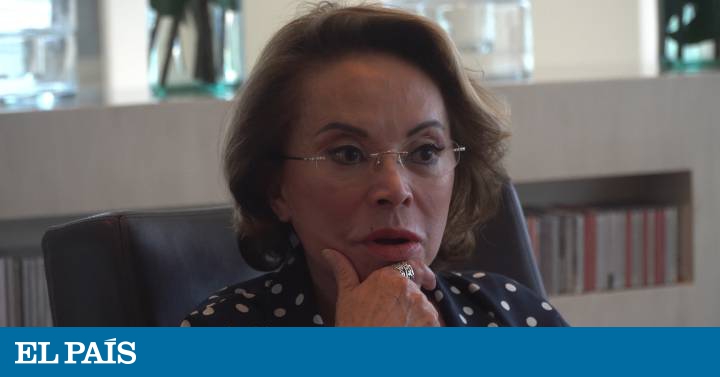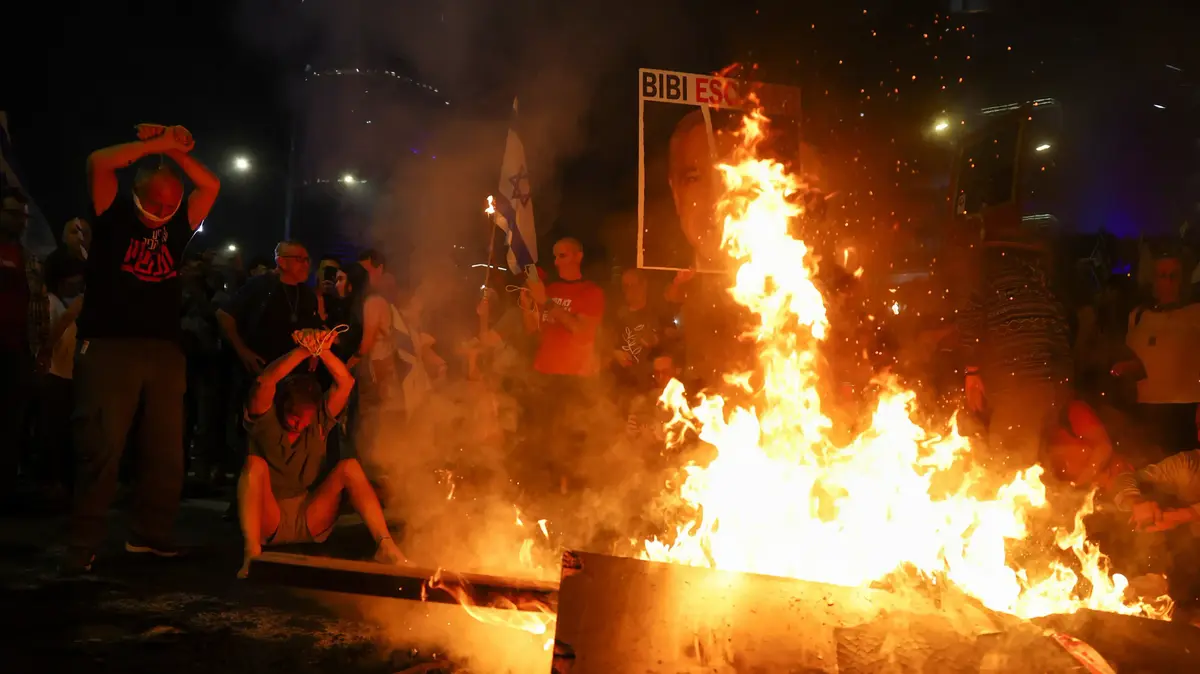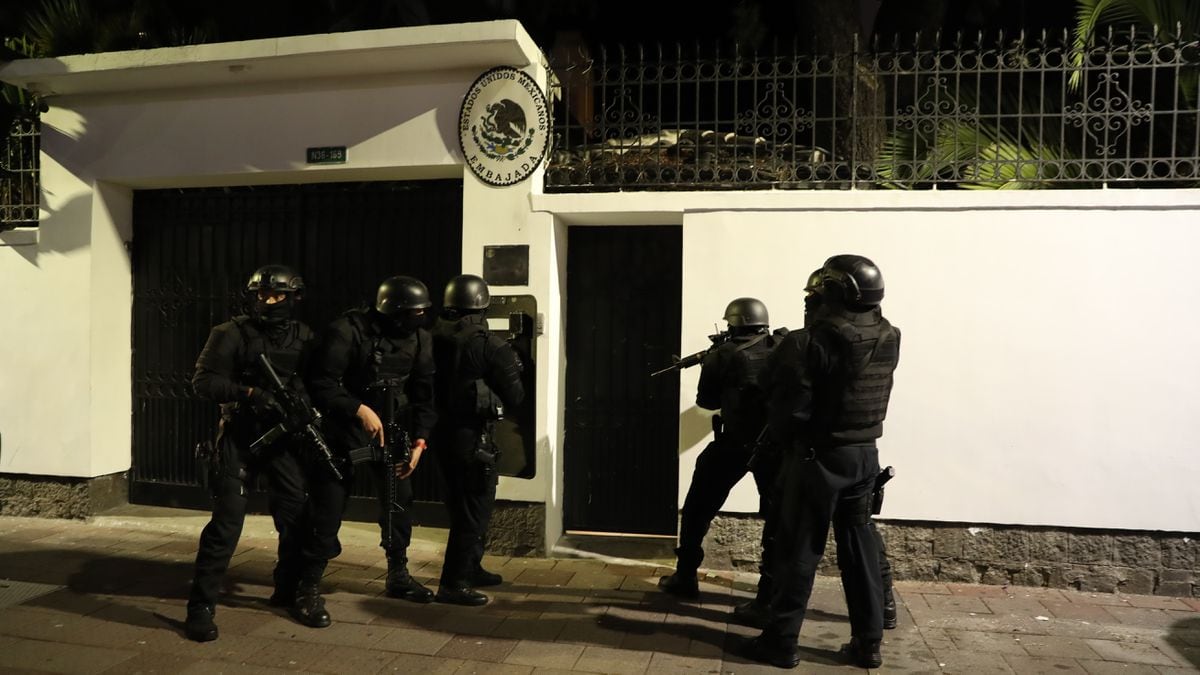The one that for decades was considered the most powerful woman and one of the most influential people in Mexican politics; who was imprisoned after facing former president Enrique Peña Nieto and, more than five years later, acquitted of all crimes, but not so much of the doubts and controversy that still permeate her, she returns to the frontline.
Elba Esther Gordillo (Chiapas, 75 years old) had an almost omnimous power while she directed for more than 20 years the National Union of Education Workers of Mexico (SNTE), the largest in Latin America, which came from the hand of Carlos Salinas de Gortari, of the PRI, party of which he was secretary general, deputy and senator and in which he militated until his expulsion in 2006. Under the PAN governments of Vicente Fox and Felipe Calderón reached the cusp of his career and his power. Until Enrique Peña Nieto came to the presidency.
MORE INFORMATION
- Absolved Elba Esther Gordillo, the former leader of the Mexican teachers union
- “Teachers will be agents of change in the Administration of López Obrador”
Master, the nickname by which she is known in Mexico, after supporting her in her campaign, opposed one of the star measures of the ex-president: the educational reform, which deactivated part of the ecosystem of the powerful union, with more than 1, 6 million affiliates, which Gordillo ran with an iron hand. In 2013, she was arrested on charges of diversion of funds, tax fraud, organized crime and money laundering. His arrest was one of the first blows of effect of the newly opened Government, which promised a fight against corruption. His release more than five years later, cleared of all charges after the prosecution could not prove the crimes, also symbolized the failure of what was once called a new PRI.
Since he regained freedom in August 2018, Gordillo's public appearances have been scarce, inversely proportional to the stealthy movements attributed to him this year and a half. Few doubt that Master will not want to intervene - when not participating - in the Fourth Transformation promised by the president, Andrés Manuel López Obrador. On the future of the SNTE, ensures that we must "take the voice" of the president and seek clean elections. “We want a participatory, plural democracy, for the election of the leaderships and for decision making. We don't want to be mere transmission belts, ”he says, always in the first person of the plural, in case there are doubts about its involvement.
Gordillo receives EL PAÍS on Saturday at noon at his home in Polanco, a wealthy neighborhood in Mexico City; in the penthouse where he also spent the last months of house arrest. Since then, he maintains an imposing painting by Gabriel Orozco, now accompanied by two by Rafael Coronel and a canvas by Rodolfo Morales, all Mexican artists. Master has just returned from Spain, where she has celebrated her birthday. He enjoyed, they say, the Prado Museum, which he was walking for six hours. This is the first interview she has given since she was acquitted of all her charges and regained her freedom. “I have resistance to it, you have to be fair, whenever I speak I have generated waves of reactions,” he says with a modesty that dissipates soon and gets, without brake, to talk for more than an hour.
Question. Why do you come back?
Reply. Go back to where? I have to live, I have to do things, there is my family, my story. I don't know if I left. What's more, I think I've never left.
Q. But what are you looking for?
R. Something essential. There is much to say. I return because there is a story that has not ended. My intention is to influence what we have dreamed of in Mexico for a long time.
Q. What does that mean, where are you going to do it from? Do you want to re-direct the teachers union?
A. I am convinced that a charge is not necessary to raise your voice and say what you believe. I want to be an active, active and committed voice with the transformation of the Mexican trade union world. Want to be what I was again? Not necessarily.
"I said no longer any action there is a reaction"
Q. How much power does the one that considered the most powerful woman in Mexico have now?
A. It depends on the perspective with which they have seen me. If what they mean is that it influenced decision-making in some situations, yes, and how good, that's what it is for. Power is transforming things. We must judge each one according to his time. Look, today that is so fashionable and I like it very much, this issue of women's rights and I see so many girls, sometimes a little radicalized but I understand them perfectly, I wonder if I have not suffered harassment for being a woman in a world of pure machismo when I was the only woman leader in this country, who before presidents said what I thought and was judged by the bag I used, for my shoes, for my dress.
P. His grandson and son-in-law have created a political movement. Do you plan to join, be part of it?
A. No, no, no, no, no. My son-in-law is a prepared man, he has merits, it is not worth endorsing him neither my merits nor my demerits. My grandson is an intelligent, capable boy, he likes politics, but he needs to get more, go to earth, not just the theory, I have told him. I do not intend to be in any match. I plan to speak, I will give my opinion and act in the democratic life of my country.
Q. What image do you think Mexican society has of you?
A. One that hurts a lot is not positive. And I can't change it overnight. It is not as I would like or what they say is real.
“I want to be an acting voice. Be what I was again? Not necessarily"
P. He has always been criticized that he was carrying an elevated life train for a union leader. Do you still keep it?
A. I think there are some mistakes on my part. I always prioritized my image, my dresses, my shoes, I always lived, like it or not, in Polanco and that is to live in a higher status than any teacher lives. There is an image that I live in a large mansion and it is not true. Now, when I bought the house it is not worth what today. And yes, I have a house in San Diego. I live well, it is not the status of any teacher, but what I have done has not been by my profession as a teacher or as a teacher leader. I have been a deputy, senator ... When I was a legislator and belonged to a commission, we were given compensation. Yes, I accepted it, but I didn't steal it. I neither washed money nor did improper things. There is a serious problem. I believe in freedom of expression and freedom of the press, but it hurts that in journalism in Mexico, which is what I know, there is little research and everyone goes away because of the rumors.
P. That is not so. There is good investigative journalism in Mexico.
R. Today. But in my time it was not like that. And research is relative. The press has also had its controls. And I don't mean reporters. Media owners also served the corporate state and received lines. It is an issue that I should not address being politically correct, but I am not like that. And that is what bothers a lot. That bothers me. Sometimes it bothers me, but why do I always have to be on the side of those who lose.
Q. Rather you have always been on the side of those who win.
A. No, that is what they believe. I have never been friends with them, only from a president can I say that I have been friends.
Q. Whose?
R. Vicente Fox, by the San Angel Group, but none more. Yes, I am sui generis, Elba Esther is that, a woman who bursts in, says that what she thinks and that is not perfect, that she has made some mistakes.
P. His return coincides with the Government of López Obrador, the so-called Fourth Transformation, where many of the actors are the same as in the past. It seems that everything changes in Mexico so that nothing changes.
A. The great emptiness we have is of leaders, of great heads of state, there is great confusion. There is crisis in all parties, in organizations, it seems that everything was worn out.
Q. And how much are you responsible for?
A. I do feel partly responsible. I feel that we are a generation that owes much to those who come. Our experience, the little, is not necessarily in the position they give us, but in what we can share.
Q. What do you think of the López Obrador Government?
R. I was glad to win. If the triumph had not materialized we would have had an outbreak, with or without his will, because the level of pressure, of disenchantment, of anger was very high. Personally, I like it very much and I think that we have to support it so that we can turn to see the indigenous people, we are a country with a deep inequality in almost everything. I am convinced that to achieve many of these things, reforms, shaking of the political system are required.
Q. What do you think of your mandate?
A. I think he is a congruent man. He is what he is, responds to the entire trajectory of his struggle. I am convinced that he has good will, but goodwill is not enough, I wish that we have available to all we can and want to achieve something positive for the country.
“López Obrador has good will, but that is not enough”
Q. Are you willing to participate in the Fourth Transformation?
A. I want to help Mexico. I don't want to be in any group.
Q. If there is anyone who knows the old regime it is you. How much of that old regime remains in this Government?
A. I would say that two very interesting stages touched me. The era in which we were sold a country of modernity, of bonanza, that everything was going to be better, that we were already from the first world. Today we see that there was nothing and we are facing another new approach. What I would like is for all of us who want to participate in the destiny of the country to think about the political engineering of the system that is going to take place. We are in a presidential system. We want a new democratic institutionality.
"Loyalty is not shushing"
Q. And do you see it possible with someone who embodies that presidential figure as few?
A. I believe that it has a great feasibility to make the transformations that are required, because the political bond and moral authority has long since a president did not have them.
Q. Have you spoken or met with the president since he was released?
R. No.
Q. And with someone from your Government?
A. Would it be important to say yes or no?
Q. I think so.
A. You imagine that I could not have greeted Julio Scherer [legal advisor to the president], whom I have special affection or to the secretary of Education, Esteban Moctezuma, who had the possibility of treating him for a long time, than when it was educational decentralization He was in a very important position. Yes, yes I have greeted him, we have talked several times, of course. I have several friends that I love and respect. If I speak of plurality, how can I not interrelate with some of them. Now, if what is meant is that I have interrelated for some political programs, no, no, no.
Q. It is hard to believe that you have taken the step back, more than a year after being released and acquitted of the charges, without the approval of the Government.
A. The politically correct has never been a premise for Elba Esther Gordillo. I never asked permission from any government or any president to do anything. Even the president who imposed me, in quotes, because it was not like that, because he was the right person to lead the organization, which was President Salinas, I remember telling him that not many times. I objected to decentralizing education as I wanted, his secretary was [Manuel] Bartlett [today director of the Federal Electricity Commission]. I remember a phrase they told me and I said no.
Q. What was that phrase?
A. Government decisions are not discussed, they are followed. Look, once the president, being governor, sorry, Mr. Peña [Nieto] told me: "Master, I would very much like you to help me in the campaign for the presidency of the Republic." I asked him if he had thought what that meant for education, for teachers. He said yes. And I thought he would be a good president, he was young, but not everything is youth, uh, life lesson. It was correct, in good ways ... Sometimes one also gets confused: I told him that I was going to participate with him. One day he called me and said: “Teacher, I am very worried, because I have doubts. If President Calderón calls her and tells her not to support me, to support the PAN, what will she do? ” I replied: “Mr. Governor, make no mistake, I have not made an electoral commitment to the president. I am committed to your government doing well and I will support your government, but not electorally. But take note, the SNTE is to be heard. ” I respect the presidents, but loyalty is not silence. The things I did with the presidents, the actions we undertook in the areas of my responsibility, were agreed upon. I have for all the ex-presidents with whom I collaborated with great respect and recognition that my voice was heard.
Q. Included Peña Nieto? Do you have respect for him?
R. I keep a huge shame and I would say some pain. In the end I think I was not wrong with him. The mistake was his. He knew that what did not suit the education workers was not going to comply. President Peña knew about my concern about raising the quality of education, we had talked a lot about it. I remember that after an SNTE Congress in which he was traveling abroad, when he returned, he called me on February 6 to congratulate me on my birthday. I reiterated my desire to speak with him again because he did not agree with the reform. I told Miguel Ángel Osorio Chong [PRI Organization Secretary in 2012] that it was a serious mistake; I told Nuño, who was Secretary of Education and told Luis Videgaray, who was Secretary of the Treasury.
"For Peña Nieto I keep grief and some pain, because I can't deny that I was responsible for being elected"
Q. Does this explain your fall?
A. I do not see it as a fall. Thus I explain my act of congruence. I said no longer any action there is reaction. I don't know why we didn't talk, if he had talked to me we would have reasoned the pros and cons. There were many interests involved. He is the only president who has not wanted to talk to me about the issue as president. With the PAN governments we achieve the best salaries. I negotiated with them, but I didn't give up. At this time of the PRI they wanted claudication. What would have happened if I had accepted that reform? The teachers would have lynched me.
Q. Why do you think his release took place in the last months of the Peña Nieto Government, during the transition to the López Obrador Government?
A. Because we fought hard to prove he was innocent. There was no record. I opposed a law and the authoritarian system acted.
Q. But I ask you at the moment, just in the transition from one Government to another.
A. I appealed to everything that was the law. I did not appeal to marches, in fact there was a claudication of my terrible guild. Those who succeed me in the union pledge to take Meade to the presidency and fail. Why did the teachers vote in favor of López Obrador? Because he offered to remove the reform. I left because I was innocent. I did not negotiate. No no no no.
Q. Emilio Lozoya has been arrested this week. Before Rosario Robles, Javier Collado. The fence over former President Peña Nieto has narrowed. What do you feel?
R. Penalty. Too bad, because I can't deny that I was responsible for being elected.
Q. Are you convinced that you will not have problems with justice again?
A. I don't have to have them. I have faith. The president is someone congruent, ethical, I have no doubt.
Q. Are you willing to transparent your fortune?
A. Everything is already transparent, everyone knows how much I have and where I have it. There is nothing to hide, nothing absolutely. I have no worries nor will I have it. When I say that I have a bad image is that there were also campaigns against me.
Q. And what mistakes did you make?
A. What I said before. The dress, the shoes, not knowing how to communicate, not having a media strategy. It is false that I gave money to the press. I had journalist friends, but I never had a strategy to communicate what I was doing. Well, my political impropriety for some is a mistake, for me it is authenticity.





/cloudfront-eu-central-1.images.arcpublishing.com/prisa/4GJCSA2L2HRTBLOQJ2DUXFBO7E.jpg)
/cloudfront-eu-central-1.images.arcpublishing.com/prisa/FGQS6IDNB5EX5EXV5SLJ3ZATFY.jpg)


